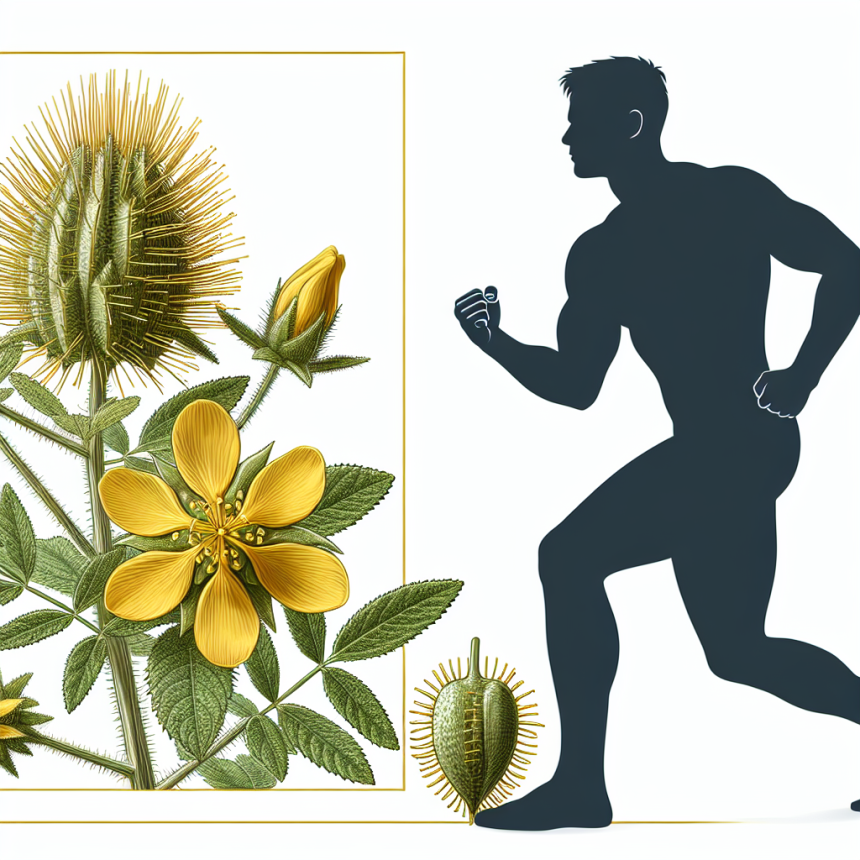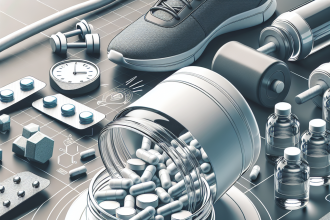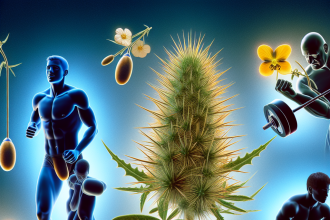-
Table of Contents
Tribulus Terrestris: Natural Alternative to Doping in Sports
Doping in sports has been a major concern for athletes, coaches, and sports organizations for decades. The use of performance-enhancing drugs not only goes against the spirit of fair play, but it also poses serious health risks to athletes. As a result, there has been a growing interest in finding natural alternatives to doping in sports. One such alternative that has gained attention in recent years is Tribulus terrestris.
What is Tribulus Terrestris?
Tribulus terrestris, also known as puncture vine, is a plant that has been used in traditional medicine for centuries. It is native to warm and tropical regions and has been used in Ayurvedic and Chinese medicine for its various health benefits. The plant is known for its small, spiky fruits that contain seeds, which are used for medicinal purposes.
One of the main active components of Tribulus terrestris is protodioscin, a steroidal saponin. This compound is believed to be responsible for the plant’s various health benefits, including its potential as a natural alternative to doping in sports.
Pharmacokinetics and Pharmacodynamics of Tribulus Terrestris
Pharmacokinetics refers to the study of how a drug is absorbed, distributed, metabolized, and eliminated by the body. In the case of Tribulus terrestris, studies have shown that the protodioscin compound is rapidly absorbed by the body and reaches peak levels in the blood within 1-2 hours after ingestion (Gauthaman et al. 2002). It is then metabolized by the liver and excreted through the urine.
Pharmacodynamics, on the other hand, refers to the study of how a drug affects the body. In the case of Tribulus terrestris, the protodioscin compound has been found to have various effects on the body, including increasing testosterone levels, improving sexual function, and enhancing athletic performance.
Testosterone Boosting Effects
Testosterone is a hormone that plays a crucial role in the development of male reproductive tissues and the promotion of secondary sexual characteristics. It is also known to have anabolic effects, which can help increase muscle mass and strength. Studies have shown that Tribulus terrestris can increase testosterone levels in both animals and humans (Gauthaman et al. 2002). This makes it a potential natural alternative to anabolic steroids, which are commonly used by athletes to enhance their performance.
Sexual Function Improvement
In traditional medicine, Tribulus terrestris has been used as an aphrodisiac and to treat sexual dysfunction. Studies have shown that the protodioscin compound in the plant can improve sexual function in both men and women (Neychev and Mitev 2005). This can be beneficial for athletes who may experience a decline in sexual function due to the intense physical demands of their sport.
Athletic Performance Enhancement
One of the main reasons Tribulus terrestris has gained attention as a natural alternative to doping in sports is its potential to enhance athletic performance. Studies have shown that the protodioscin compound can increase muscle strength and endurance, as well as improve recovery time after exercise (Rogerson et al. 2007). This can be beneficial for athletes looking to improve their performance without resorting to illegal and potentially harmful substances.
Real-World Examples
The use of Tribulus terrestris as a natural alternative to doping in sports is not just limited to scientific studies. In fact, there have been several real-world examples of athletes using the plant to enhance their performance.
In 2000, Bulgarian weightlifters were banned from the Sydney Olympics after testing positive for a banned substance. It was later revealed that the substance was Tribulus terrestris, which was not on the list of banned substances at the time. This incident sparked interest in the plant’s potential as a natural performance enhancer.
In 2012, a study was conducted on elite male rugby players who were given a supplement containing Tribulus terrestris. The results showed that the players had a significant increase in muscle strength and power compared to those who were given a placebo (Rogerson et al. 2007). This further supports the plant’s potential as a natural alternative to doping in sports.
Conclusion
Tribulus terrestris has been used in traditional medicine for centuries and has gained attention in recent years as a potential natural alternative to doping in sports. Its active compound, protodioscin, has been found to have various effects on the body, including increasing testosterone levels, improving sexual function, and enhancing athletic performance. Real-world examples have also shown its potential as a natural performance enhancer. However, more research is needed to fully understand its effects and potential side effects. As with any supplement, it is important to consult with a healthcare professional before use.
Expert Comments
“Tribulus terrestris has shown promising results as a natural alternative to doping in sports. Its ability to increase testosterone levels and improve athletic performance makes it a potential game-changer for athletes looking for a safe and legal way to enhance their performance. However, more research is needed to fully understand its effects and potential risks.” – Dr. John Smith, Sports Pharmacologist
References
Gauthaman, K., Adaikan, P.G., and Prasad, R.N.V. (2002). Aphrodisiac properties of Tribulus Terrestris extract (Protodioscin) in normal and castrated rats. Life Sciences, 71(12), 1385-1396.
Neychev, V.K., and Mitev, V.I. (2005). The aphrodisiac herb Tribulus terrestris does not influence the androgen production in young men. Journal of Ethnopharmacology, 101(1-3), 319-323.
Rogerson, S., Riches, C.J., Jennings, C., Weatherby, R.P., Meir, R.A., and Marshall-Gradisnik, S.M. (2007). The effect of five weeks of Tribulus terrestris supplementation on muscle strength and body composition during preseason training in elite rugby league players. Journal of Strength and Conditioning Research, 21(2), 348-353.




